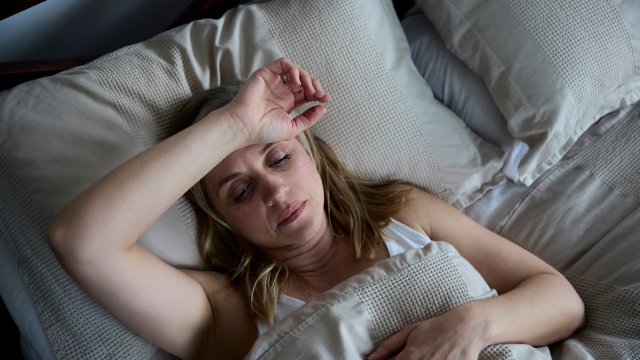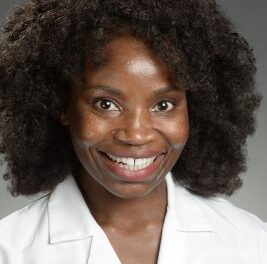I have a patient that I look after, and I couldn’t control his blood pressure. Every time he came to see me it just got higher and higher.
On the seventh consultation, I realised that his wife, who was 10 years younger, was 48.
“Is everything all right?” I asked him. “I don’t understand why your blood pressure’s not getting any better. Are things okay at home?”
He replied: “The intimacy is gone, my wife is getting hot flushes. She’s really angry. I’m really stressed.”
I asked him to bring her to the next consultation.
His wife was perimenopausal. She hadn’t known what was going on. She told me she thought she was going crazy. Eventually, I put her on treatment for her symptoms, and lo and behold, she felt better, and his blood pressure came down too!
That’s why I say that when the woman is well, the household is well. Women’s health is not a gendered discussion: it’s a discussion for everybody in society.
After all, we have men working in the medical field too, and those conversations are crucial in this setting. When I was a junior doctor, sitting in with my male gynaecology consultant, a woman came in for her appointment. This woman had built up the confidence to speak to the consultant and said to him: “It’s really painful having sex, the skin splits around my vagina.”
Now that I’m Older Nighat, I know what her health issue was: vulval lichen sclerosis – non-cancerous, itchy white skin patches on the genitals that get mistaken for a sexually transmitted infection. Women can get scarring around the vulval and vaginal area, which makes the vaginal opening tight, the skin sore, and easily prone to splitting.
But at the time, the gynaecology consultant’s response was: “Have two glasses of wine and lie back.” He basically told her to think of England.
She looked at me horrified – and I looked back at her horrified. But the hierarchy in that consultation room meant I couldn’t say anything to the consultant. I could see her face thinking: “I can’t believe I put myself out there, and this is the response I got from a health care professional.”
That story saddens me every time I think about it. I failed her in that consultation.
We have taboos around women’s bodies. Our breasts aren’t our breasts, they’re hypersexualised by society. Our buttocks, our bodies, our stomachs, every bit of us, is actually under the ownership of somebody else.
It’s why sometimes, when I offer contraceptive products to teenagers for menstrual issues, their parents refuse – fearing other people might judge their children as sexually promiscuous. Of course, teenagers can speak to their GP about contraception alone, but not all of them will.
On a segment for This Morning with the MP Dawn Butler, who has had breast cancer, I demonstrated a breast exam on myself, while I was fully clothed. I got so much pushback for doing that. The vitriol was from some men and women in my own community who accused me of showing off my breasts on national TV. Some claimed I “might as well have been naked”. There is so much stigma and shame around women’s bodies.
As such, I’ve done workshops on how to self-check for breast changes with conservative faith-based communities by using bread dough balls with a frozen pea inside, instead of diagrams and pictures, because this was a more culturally acceptable way to help men and women understand the importance of self-checking and attending mammogram appointments.
We still have so far to go in women’s health. There is so little funding available for research and investment in women and girls, but if people realised how much women’s health problems were costing the economy, I think we would see more money allocated for it.
Take menstrual health issues. It is estimated that 13 per cent of girls miss an entire school day at least once a month due to problem periods, which affects their education. Women may stop taking part in activities because they are having heavy, painful periods. If they are regularly in serious pain, they might not pursue career paths they are suited to.
As a GP, there are too many patient issues I don’t have solutions for because there is not enough research. I wish I knew more about how periods and hormones affect those who are neurodiverse. I want to offer these patients evidence-based gold standard care rather than using the “best guess” approach we currently have.
There is also a lack of research on menstrual health experiences among women from hearing- and visually-impaired communities. We don’t have the high-quality data we need to serve LGBTQ+ communities either. We don’t know why Black women are 80 per cent more likely to get fibroids. When people ask me whether the “pill will make them gain weight”, I currently say, “It’s 50/50, you might, or you might not” – because the definitive data just isn’t fully available.
If I could do one thing to improve women’s health today, it would be early intervention to stop so many women having difficulties in their sexual lives over time.
There are two problems I see regularly. One is vulvolvaginal atrophy (VVA) – the thinning, drying and inflammation of the vaginal walls that may occur when your body has less estrogen. It occurs mostly after menopause, but early symptoms can occur in perimenopause and breastfeeding women. Not only can it make intercourse painful, it can lead to other urinary symptoms. The other is lichen sclerosis, which I mentioned above. There’s no cure for it, but treatment can help relieve the symptoms.
Symptoms can be prevented or managed for most women by using a topical vaginal moisturiser – something organic, that doesn’t contain any glycerin or parabens. Localised topical vaginal estrogen will replace the estrogen that is lost, which will help prevent and treat VVA. I’m in my late 30s, and I already use these items. I’d give them to all women in their early 40s. Our vaginas will thank us in 10 years’ time!
I’d give more women vibrators too – orgasms are very good for women’s health. They help our pelvic floor muscles and lower blood pressure. The endorphins released by an orgasm can help relieve pain and stimulate oxytocin, which reduces cortisol, in turn reducing stress and aiding better sleep.
As told to Izin Akhabau
This week I have been…
Swimming… I didn’t know how to swim 18 months ago. I watched YouTube videos to learn. I had a fear of water from nearly drowning when I was about five years old in Pakistan. Then I had real body image issues and the thought of being in a swimsuit filled me with anxiety.
It was when I noticed that my three boys also don’t know how to swim that I decided I cannot pass on generational shame and trauma to them. With the support of Her Spirit, a group helping women get active, I put my armbands on, and took to the water with my boys. We are all now confident independent swimmers going to the pool at least two to three times a week.
Attending… Tring Book Festival. I took my 12-year-old son, even though it was a school night. He was in the audience while I was speaking about menopause as a panellist on stage.
At the end of it, there was a Q&A, and he said: “I had no idea women feel like this, Mummy.” I thought to myself, I’m really pleased I took you with me. It’s so important to have these conversations from a young age.
Recording… a podcast with a dear friend of mine, Dr Veena Babu. It’s called The Mindset, and it was all about what makes me tick.
That was a really fun discussion. The things that make me tick are a passion to learn, and giving back to my community, so I make health content in Punjabi and Urdu.
I do get a lot of enjoyment from meeting my patients during my clinics and creating healthcare content on TikTok. In one of my recent videos, I shared that you can still get pregnant during perimenopause. That surprises so many women. The comments are always full of women who are having different health issues and that motivates me to keep going.
Finally, centering myself through prayer is important to me – the world can be a dark place, so I need to ground myself, knowing that some things are beyond me and that God has the best of plans.
Dr Nighat’s book The Knowledge: Your guide to female health – from menstruation to the menopause is out now




